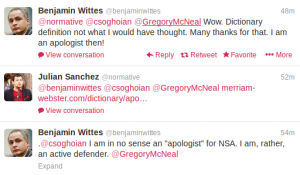Ron Wyden’s Past Provocative Hearing Question on Cell Site Location
As I’ve noted, yesterday Ron Wyden got Keith Alexander to refuse to answer a question about whether the NSA has ever collected or made plans to collect Americans’ cell-site information in bulk.
Wyden: Senators Udall, Heinrich and I and about two dozen other senators have asked in the past whether the NSA has ever collected or made any plans to collect Americans’ cell-site information in bulk. What would be your response to that?
Gen. Keith Alexander (Alexander): Senator, on July 25, Director Clapper provided a non-classified written response to this question amongst others, as well as a classified supplement with additional detail. Allow me to reaffirm what was stated in that unclassified response. Under section 215, NSA is not receiving cell-site location data and has no current plans to do so. As you know, I indicated to this committee on October 20, 2011, that I would notify Congress of NSA’s intent to obtain cell-site location data prior to any such plans being put in place. As you may also be aware, –
Wyden: General, if I might. I think we’re all familiar with it. That’s not the question I’m asking. Respectfully, I’m asking, has the NSA ever collected or ever made any plans to collect Americans’ cell-site information. That was the question and we, respectfully General, have still not gotten an answer to it. Could you give me an answer to that? [my emphasis]
In addition to saying NSA is not doing so under Section 215, Alexander also pointed to two classified responses he would not repeat in unclassified setting.
Which I think confirms — as if there was any doubt — that the answer is yes, the NSA has at least planned, if not actually collected, cell-site location in bulk (though not necessarily under Section 215).
That said, many people are treating this as Wyden’s first provocative hearing question on the topic. This one — from February 2012, just after the US v Jones decision found use of a GPS to constitute a search — may provide some important insight onto the timing and rationale behind such bulk collection.
Wyden: Director Clapper, as you know the Supreme Court ruled last week that it was unconstitutional for federal agents to attach a GPS tracking device to an individual’s car and monitor their movements 24/7 without a warrant. Because the Chair was being very gracious, I want to do this briefly. Can you tell me as of now what you believe this means for the intelligence community, Read more →


